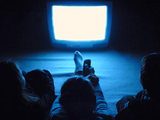British TV viewers becoming nation of 'chatterboxes'
Almost half of people aged under 35 claim to have commented to others via online or text message while watching a TV programme, in an emerging trend called "chatterboxing".
According to the Telescope 2012 study by the BBC's TV Licensing organisation, the rise of "two-screen" viewing of TV shows, in which people use a laptop, smartphone or tablet while also watching programmes, is changing habits around television consumption.
One in four adults (26%) said that they have commented to others via social networks such as Twitter and Facebook, online forums or SMS about a TV programme they were watching, but this increases to just under half (44%) among people under 35.
Rather than dilute the importance of live TV viewing, this trend of "chatterboxing" has actually done the opposite, said the report. An ICM poll found that 24% of people aged under 35 watch a programme live rather than on catch-up because they enjoy the social media chatter, while 19% do so because they were worried about 'social media spoilers'.
In positive news for Channel 4's new 'social buzz'-driven catch up TV channel 4seven, the report found that social media is also driving people's TV viewing. One in six respondents aged under 35 (17%) said that they can be persuaded to watch a programme if they see online chatter about it.
Psychologist Corinne Sweet said that "chatterboxing" taps into people's desire to share emotional experiences around television with others, even when they are on their own.
"Wanting to communicate with others when you experience emotions such as sadness, entertainment, fear or awe is a part of the human condition," she said.
"As television often prompts these feelings, it is not surprising that more of us are taking advantage of evolving technology to share our thoughts as we watch TV, even if we are home alone."
Twitter UK spokesperson Rachel Bremer added: "People come to Twitter to connect with what they are most interested in, and that may be a TV show, character, or live event.
"The public nature of the platform means that people can easily follow and join conversations about what they're watching in real time, adding to the social experience of television viewing."
The TeleScope survey found that people in Britain consume 28 hours of television every week, of which 2.5 hours is via catch-up services such as BBC iPlayer and 4oD on the television set.
TV fans are also topping this up by spending on average three hours per week watching programmes on smaller screens, including laptops, smartphones and tablets, according to ICM polls. In total, this adds up to 31 hours per week, or more than two months of TV per year.
One in four people (25%) said that they have watched TV on the go via services such as iPlayer and Sky Go, rising to 65% among over 35s.
For the London Olympics this summer, 88% of respondents plan to watch the action on a TV set, while 7% will catch the action on a PC or laptop, but only 1% respectively expect to watch on smartphones and tablets.
Live TV remains dominant, but timeshifted viewing via catch-up services or personal video recorders now accounts for 9.2% of all UK TV consumption, up from 7.1% in 2010.
Alongside virtual gatherings around programmes, TV is also bringing people together physically, as a third of adults under 35 have had a TV-themed party in the last five years, including popular themes of The X-Factor, World Cup 2010, Royal Wedding and Eurovision.
BBC TV licensing head of revenue management Pipa Doubtfire said: "This year's TeleScope report points to the fact that people are taking advantage of new technologies to ensure they can enjoy TV in more ways than ever before, whether watching on bigger sets at home, via mobile technologies on the go, or on catch-up. And, of course, the chatterboxing phenomenon is bringing a new dimension to TV as a collective, social experience."
Iain Logie Baird, the grandson of TV inventor John Logie Baird and curator at the National Media Museum in Bradford, said few would have imagined the shape of modern TV viewing when his grandfather introduced the first practical set in 1926.
"Television continues to hold our attention for two reasons. Firstly because of the quality and choice of content. Secondly because a huge range of interfaces have evolved to suit every taste and lifestyle," he said.
"We can easily control how and when we watch TV by creating our own TV schedules from the abundance of content available, or tuning in on-the-go via a mobile device.
"We have more choice than ever before, and each person, family or household has the opportunity to mould their television experience according to their personal preference."
Yesterday, BBC director general Mark Thompson confirmed plans for the corporation to create an iTunes-style store this year, offering paid downloads of BBC programmes.

